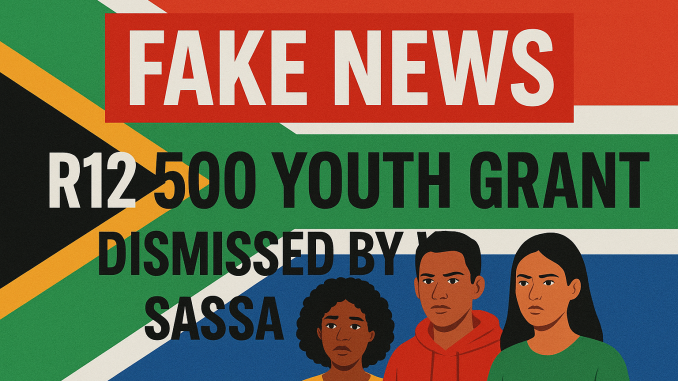
A claim about a once-off R12,500 Youth Grant for South Africans aged between 18 and 35 has gone viral across social media, sparking hope among many unemployed young people who saw it as an opportunity to start businesses, pay for training, or support community projects.
According to the posts, applications for this grant supposedly opened on 15 August 2025, with the criteria that applicants must be unemployed, not receiving any other state grant, and willing to submit a business plan. However, official agencies have confirmed that this information is false.
The National Youth Development Agency (NYDA) publicly dismissed the claims, stating clearly that there is no once-off R12,500 Youth Grant being offered. The agency reminded the public that all its legitimate applications are processed through the official Enterprise Resource Planning (ERP) portal and not through links shared in viral videos or blogs.
Similarly, the South African Social Security Agency (SASSA) issued a fake news alert, warning citizens that the posts circulating about the grant do not come from SASSA. Independent news outlets have also confirmed these denials, noting that while the rumours looked convincing, they were not backed by any official announcement.
Despite the rumours being false, they spread widely because they tapped into the real struggles of South Africa’s youth. Statistics South Africa’s most recent labour survey shows that youth unemployment remains alarmingly high at 46.1 percent, with the overall unemployment rate standing at 33.2 percent in the second quarter of 2025. Against this backdrop, it is not surprising that the idea of financial support spread quickly and resonated so strongly with young people who are desperate for opportunities.
Although there is no such once-off youth grant, there are real programmes aimed at supporting young South Africans. The NYDA runs an existing grant programme that provides financial and non-financial support to youth-owned businesses, but this is not a fixed R12,500 payout.
The agency offers mentorship, training, and business vouchers to qualifying applicants, and the entire process is managed through its official ERP portal. Another genuine platform is SAYouth.mobi, part of the Presidential Youth Employment Intervention, which is free to access and provides young people with opportunities for earning, learning, and training. This initiative is government-backed and run in partnership with NYDA, Harambee, and other organisations, making it a credible resource for young jobseekers.
Officials urge the public to be cautious and to always verify grant-related information through trusted sources such as official government websites and verified agency accounts. They also warn against sharing personal information or paying money to apply for opportunities, since legitimate programmes like those run by NYDA and SAYouth.mobi do not charge application fees.
For those who may have already shared sensitive details or made payments based on the false grant claims, it is advised to contact NYDA’s fraud line and their banks and to report the matter to the South African Police Service.
The bottom line is that there is no R12,500 youth grant currently being offered by the government, despite what social media posts suggest. The story highlights both the desperation of unemployed youth and the dangers of misinformation in the digital age.
Real support for young South Africans does exist through programmes like the NYDA enterprise support and SAYouth.mobi, but it is critical that applicants rely only on official channels. Until government agencies make any formal announcements, young people are urged not to be misled by false promises circulating online.

Leave a Reply